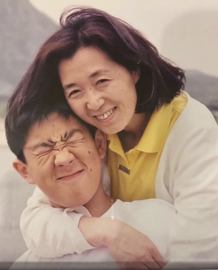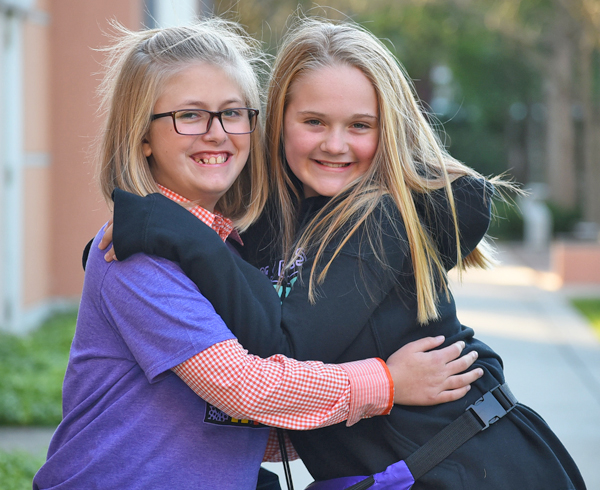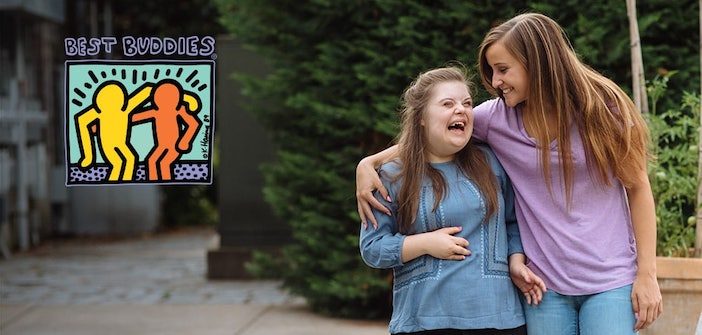There’s a saying that goes, “A mirror reflects a man’s face, but what he is really like is shown by the kind of friends he chooses.” Thus, it’s no surprise that even while preparing for their own futures, the students in Beijing’s international school community take time to reach out and make positive impacts in the lives of children with special needs.
One such group that pairs students with a-typical peers is Best Buddies International, an American nonprofit organization founded back in 1989 that provides inclusion opportunities for people with intellectual and developmental disabilities (IDD).
In April of last year, Best Buddies China started a One-to-One Friendship Program with students at Harrow Beijing, fostering friendships between their students and other kids with IDD. What’s more, despite being separated during COVID-19, the program has continued, with the kids and their buddies staying in touch through the e-Buddies Program.
We spoke with Janice Bareng-Pineda, the Best Buddies coordinator at Harrow Beijing, to find out more about the program, how e-Buddies functions, and the friendships that have blossomed from it.
Tell us about Best Buddies International and how it was first introduced in Beijing. What’s the relationship between Best Buddies and RongAi RongLe?
Best Buddies International is a non-profit organization founded in the United States in 1989. It has programs supporting individuals with intellectual and developmental disabilities (IDD) in terms of inclusion in the community, jobs and special needs self-advocacy. Its main programs are One-to One Friendships, Integrated Employment and Leadership Development. Best Buddies has already reached out all over the United States and 51 countries in six continents.


Best Buddies International has given a significant impact on the life of one of the founders of RongAi RongLe, Ms. Xiaogeng Wang. Wang, together with her son who has developmental disability, lived in the US from 2005-2010. During that period, her son received a lot of services and support from schools and communities, including involvement in Best Buddies activities, which he enjoyed the most. This has made her son’s life totally different from their life in China.
He improved his self-help and social skills and he was able to do lots of things in the community together with other people. This influenced Wang to start up an organization offering the same programs in China. She realized that a change has to be made especially in dealing with discrimination based on disability, and building a support system for people with intellectual and developmental disabilities and their families. Wang then founded RongAi RongLe on her return to China.
Beijing RongAi RongLe Family Support Center for Persons with Intellectual and Developmental Disabilities (“Rong Ai Rong Le”) was founded by 15 parents of persons with intellectual and developmental disabilities in 2011. It is an advocacy organization representing the rights of persons with intellectual and developmental disabilities.
In March 2019, RongAi RongLe (RARL) received the formal accreditation from Best Buddies International to carry out its programs. Best Buddies China then started the One-to-One Friendship Program at Harrow Beijing in April of 2019.

Who does this program serve and help?
The IDD community that Best Buddies serves include, but is not limited to, people with Down syndrome, autism, fragile X syndrome, Williams syndrome, cerebral palsy, traumatic brain injury, and other undiagnosed disabilities.
How are students at Harrow Beijing involved in the project? What kind of students have been participating?
Harrow Beijing included Best Buddies as one of the Leadership in Action enrichment activities for students in April 2019. Students from Year 5 to Year 13 joined the program. Students with special needs/IDD, who are assisted by RARL, come to Harrow Beijing and join students in different activities. In the activities, Harrow students deepen their understanding about people with special needs/IDD by being actively engaged with their “buddies”. Activities include games, arts and crafts, board games, reading at the library, and football. More activities are planned to give opportunities to develop friendships among students.

What do these students find most enriching about the experience?
Students of RARL enjoy a lot of their time with their Harrow peers. They feel happy and look forward to meeting their Harrow peers every week. We think this is the most important point.
Almost all students of RARL live a so-called isolated life. They either study at special schools or stay home due to suspension of study. So their social circle is very limited in their daily life. There is a limited opportunity for them to meet friends within the same age group. Going to Harrow and taking inclusive class with Harrow students who are in their age becomes the opportunity for them to experience and learn about socialization and inclusion. What’s more, teachers and students at Harrow are very friendly, kind and patient for students of RARL. Being welcome and taking good care is always needed for everyone, and for students of RARL, especially so.
Harrow students experienced and learned that communication can be expressed in various ways. One student shared that he was able to figure out what his buddy was trying to say by attentively observing his gestures. He patiently tries many ways to talk to his buddy.
Students have shown their leadership skills by mentoring their buddies and leading different activities. It is very inspiring to see how kind and considerate the students are towards their “buddies”.

During COVID-19, how are the students participating? Tell us about the e-Buddy program and what kind of activities the students have been doing online.
During COVID-19, we carried out our first e-Buddies program. It was a one-week program. There were 30 youths with IDD paired with volunteers participating in the e-Buddies program. They had video calls every day via WeChat. The program team also prepared different topics for those peers to talk and work out together via video calls. For example, they talked about topics like why we have to stay home, what is COVID-19, how to wear masks and how to wash your hands, and also some actions songs the peers could work out at home, like physical activities, dance, handcraft, drawing, and cooking. At the end, we held an online KTV party as a culminating activity.
What are the friendships formed through this program like?
Based on different individual characters, there are different forms of friendships among the peers. Some of them are very chatty, so they enjoy talking with each other and sharing ideas. But for those with little or no speech capability, they meet online to listen to music and just be company for each other.
There was one participant with very little speech capability. It felt that it was not possible to have verbal interaction between partners during video calls. However, the pair kept on meeting online and followed the prepared to-do list conscientiously. After several calls, one peer ended the call by saying, “talk to you tomorrow”, on her own initiative. This short phrase surprised the parents and moved the other person on the line. This has indeed proven how one’s company can affect people with IDD.

Can anyone in Beijing participate?
We welcome all people to participate in Best Buddies program. We partner with schools to offer participation opportunities to students in primary school, middle school, high school, and college or university. We have Citizens Best Buddies for people in the community to join in, and e-Buddies for people with different ages and in different location to join in. In 2020, we are going to launch Best Buddies Jobs program to partner with companies, so that employees can participate in our program.
Please include anything we didn’t ask but you feel our readers should know.
According to the World Health Organization, nearly 3 out of 100 people in the world have IDD, making this the largest disability group on the planet. It is also one of the world’s most marginalized groups. People with IDD are nearly three times more likely to live in poverty than people without IDD. In China, the population of people with IDD is about 12 million.
Most people with IDD live their lives in the company of family members or paid caregivers lacking the necessary skills to self-advocate. When people with IDD are unable to keep a job, it is most often due to a lack of social skills rather than a lack of ability to perform the work required.
The social network that students build during their daily interactions with peers contributes to their evolving sense of self and capabilities. But social opportunities are often non-existent for children with IDD.
Best Buddies tackles these problems through the friendship programs, jobs program, our e- Buddies program, and ambassador program. By introducing a person with IDD to a peer without IDD in a supported, positive setting, we combat loneliness and isolation, while increasing society’s acceptance and understanding of people with IDD. Our programs provide people with IDD the resources they need to support themselves and learn valuable social skills that give them confidence. Well-developed social skills can help youth with IDD develop positive relationships, succeed in school, and begin to successfully explore adult roles such as employee, co-worker, and community member.
For the most up to date list of the countries that Best Buddies has a presence in, please visit www.bestbuddies.org.
Harrow Beijing currently runs the Friendship Program of Best Buddies. This program aims to promote inclusion not only within the Harrow community, but also extending our plans to go further and beyond, unfurling Harrow’s banner; Leadership for a better world.
For more information, you can contact Michelle Wang, a representative of Best Buddies China/RARL at wangxh@co-inclusion.org, or if you want to know about Best Buddies school-based program, contact Janice Bareng-Pineda at jpineda@harrowbeijing.cn.
Photos: Janice Bareng-Pineda, lnhspanthers.com, bestbuddies.org, bestbuddieschampions.org




